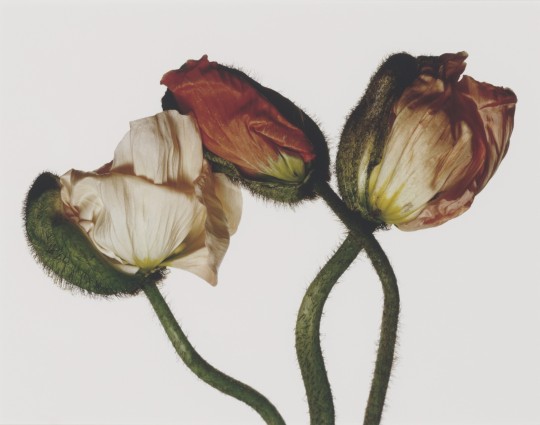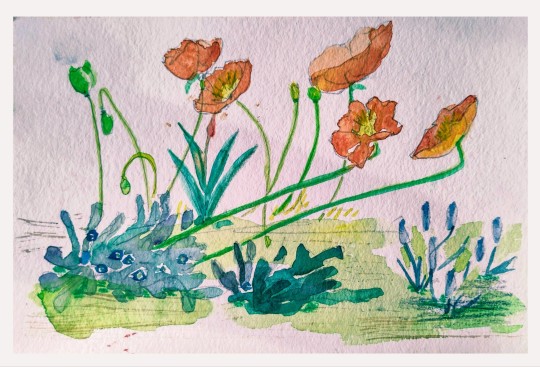#iceland poppy
Explore tagged Tumblr posts
Photo

Irving Penn - Iceland Poppy (2006)
7K notes
·
View notes
Text

Irving Penn: Iceland Poppy (2006)
1K notes
·
View notes
Text

Annika Kafcaloudis
#Annika Kafcaloudis#beautiful#flower#nature#studio photography#product photography#photography#film photography#pink#warm#Iceland poppy#Papaver nudicaule#boreal#flowers#plants#plant#gorgeous#blooming#bloom#icelandic
19 notes
·
View notes
Text

This is one tough flower. This is in a front corner of my house that still needs to be cleaned out yet. This Iceland Poppy was not planted here but it seems to like it here in this bed of lava rock.
Go figure 😮
Have to clean this area and kill weeds. Maybe I can transplant to a new home, and then kill weeds
#nature#Iceland poppy#yard flowers#flowers#weeds#photographers on tumblr#original photography#original photographers
24 notes
·
View notes
Text


As a plant biologist, I pride myself on knowing my plants’ scientific names. However, until recently there was one enigmatic flower I didn’t know the name of, despite having seen it in the garden since childhood.
This papery orange poppy with silvery green leaves was simply known as a “Danish poppy” since my parents brought the original seeds or plants from an old farm in Denmark where it grew as a semi-wild ornamental among the cobblestones. In my numerous visits to public and private gardens in the UK, I never saw a poppy quite like our “Danish poppy” at home.
I set out to discover the identity of this familiar yet mysterious flower. Although plant ID apps are trendy, I am sceptical since they often misidentify plants. I prefer to use my critical thinking with key words in a web search engine. These Key words are the general plant type (for example “poppy”) along with colour and geographic location as well as any other useful information such as whether the plant is domesticated or wild. I began by inspecting the search result’s image section to see if any of the photos resembled the unknown plant, and then I compared images to narrow down the probable species.
To confirm the identity, I did a second web search with the possible scientific name and scrutinised the image results. This process led me to find the correct scientific name of our poppies.
Our “Danish poppy” is known to gardeners as an “Iceland Poppy” (Papaver nudicale). This short-lived perennial poppy species is native to subarctic habitats in North America, Northern Asia, the mountains of Central Asia, and temperate regions of China but it does not naturally occur in Iceland or the rest of Europe.
Iceland Poppies are hardy and low maintenance, but they do not transplant well and thrive when grown from seed in well-drained soil with full sun. That’s why our “Danish Poppies” are often growing in odd places like the corner of a vegetable bed or cracks in the walkways. The delicate orange colour is genetically recessive and therefore rarer compared to the more common white and yellow flower colours.
Iceland Poppies contain an unusual flavoalkaloid pigment called nudicalin that retains its yellow hue even when the pH shifts between acidic and basic. Other alkaloids extracted from this plant have potential as anti-inflammatory medicine.
There may be botanical surprises hiding in your own garden, all it takes is curiosity and observation to discover them!
#katia plant scientist#botany#plant biology#plants#plant science#plant identification#poppy#poppy flower#plant scientist#garden#flowers#nature#plant aesthetic#orange#orange flowers#poppies#iceland poppy
15 notes
·
View notes
Text
4th video for our month of plants :)
Getting close to the end of the week, but we made it in time!
This is a fun challenge we two sisters are doing, where I paint and she talks about a particular plant. This time it's poppy, who you might know for it's infamous properties, but let me tell you, that's not even the half of it.

@cybermanolol : the poppy I drew is the Iceland poppy (along with a few more flowers). I kept it fairly simple this time, I think that's what suits this plant best
@_chalulu_ my sources are Le Régal végétal by François Couplan.
Choose your harvesting location well:
Do not enter private property and never harvest in a protected area. Also avoid roadsides or polluted sites.
Be sure to correctly identify everything you pick so as not to damage a rare species or poison yourself.
When in doubt, abstain or call someone with the relevant competence.
Harvest plants sparingly, only where they are abundant and never collect too much.
Take only as needed and do not pull out the entire crops.
Wash before eating.
Carefully sort and wash the crop. Be careful, only cooking can prevent certain diseases or parasites such as echinococcosis or liver fluke.
#my art#watercolour#pleinairpril#watercolor#video#poppy#Iceland poppy#painting#illustration#drawing#らくがき#イラスト#nature#traditional illustration#traditional art
20 notes
·
View notes
Text

https://wildflower-seed.com/
#archive#archiving#web archive#california#napa valley#cornflower#lupine#california poppy#tickseed#scarlet flax#flax#wallflower#blanket flower#dames rocket#dame's rocket#blue flax#baby blue eyes#baby-blue-eyes#shirley poppy#globe gilia#gilia#bird's eyes#bird's-eyes#satin flower#evening primrose#sweet william#catchfly#yarrow#iceland poppy
11 notes
·
View notes
Text
Beautiful Illustration of Iceland Poppy
Immerse yourself in the delicate beauty of this Iceland Poppy illustration. With its soft petals and vibrant hues, this artwork captures the elegance and charm of this stunning flower. Perfect for nature lovers and art enthusiasts who appreciate the intricate beauty of botanical illustrations. 🌸🌿



#illustration#ilustraciondigital#ilustration#illustration art#funny post#funny#funny art#funny image#ha ha funny#funny memes#funny pics#cute#cute art#cute plants#cute flowers#cute illustration#so cute#cute aesthetic#plant lover#plants#planet of the apes#plantblr#plant photography#flowers#flowers lovers#flowrs#flowers blooming#iceland#iceland poppy#flowers of tumblr
8 notes
·
View notes
Text














Watson Lake, YT
The pioneer road completed in 1942 was about 1,680 miles (2,700 km) from Dawson Creek to Delta Junction. The Army then turned the road over to the Public Roads Administration (PRA), which then began putting out section contracts to private road contractors to upgrade selected sections of the road. These sections were upgraded, with removal of excess bends and steep grades; often, a traveler could identify upgraded sections by seeing the telephone line along the PRA-approved route alignment. When the Japanese invasion threat eased, the PRA stopped putting out new contracts. Upon hand-off to Canada in 1946, the route was 1,422 miles (2,288 km) from Dawson Creek to Delta Junction.Border crossing at Port Alcan station
The route follows a northwest then northward course from Dawson Creek to Fort Nelson. On October 16, 1957, a suspension bridge crossing the Peace River just south of Fort St. John collapsed. A new bridge was built a few years later. At Fort Nelson, the road turns west and crosses the Rocky Mountains, before resuming a westward course at Coal River. The highway crossed the Yukon-BC border nine times from Mile 590 to Mile 773, six of those crossings were from Mile 590 to Mile 596. After passing the south end of Kluane Lake, the highway follows a north-northwest course to the Alaska border, then northwest to the terminus at Delta Junction.
Postwar rebuilding has not shifted the highway more than 10 miles (16 km) from the original alignment, and in most cases, by less than 3 miles (4.8 km). It is not clear if it still crosses the Yukon-BC border six times from Mile 590 to Mile 596.
Source: Wikipedia
#Evangelical Free Church of Canada#Iceland poppy#Watson Lake#Northern Lights Centre#Alaska Highway#street scene#travel#original photography#vacation#landmark#landscape#countryside#summer 2023#flora#nature#Canada#Alaska-Canadian Highway#ALCAN Highway#Alaskan Highway#the North#Yukon#mural#tourist attraction#cityscape#architecture#log cabin#Sign Post Forest#wildfire smoke#small town
1 note
·
View note
Text

Icelandic Poppies - Susan Ashworth
British , b, 1968 -
Oil on board , 8 x 8 in.
203 notes
·
View notes
Text

Poppy Lar! You're gonna be Poppy Lar! I'll teach you the proper pleas When you talk to bees Little ways to wave and bounce Ooh! I'll show you fertilizer! How to cross breed there! You're gonna be Poppy Lar!
#poppy#icelandic#orange#original photographers#photographers on tumblr#inner life of flowers#flowers on tumblr#flowers#flower of the day#flower#macro#photography
21 notes
·
View notes
Text
halifax being geographically closer to dublin ireland than to victoria british columbia explains a lot of things...
38 notes
·
View notes
Text

(source)
17 notes
·
View notes
Text

redbubble | ko-fi
2 notes
·
View notes


